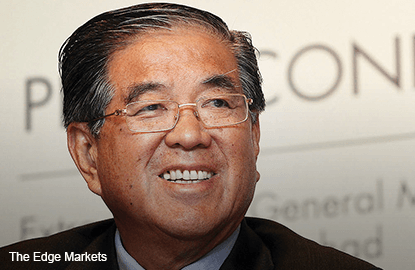
This article first appeared in digitaledge Weekly, on September 14 - 20, 2015.
 WHILE OSK Holdings Bhd (OSKH) only managed to garner an 89.4% stake in PJ Development Holdings Bhd (PJD) after its offer of RM1.56 a share closed last week — coming in below the required threshold to invoke a compulsory acquisition of the latter — its chief executive Tan Sri Ong Leong Huat should still be happy with the results.
WHILE OSK Holdings Bhd (OSKH) only managed to garner an 89.4% stake in PJ Development Holdings Bhd (PJD) after its offer of RM1.56 a share closed last week — coming in below the required threshold to invoke a compulsory acquisition of the latter — its chief executive Tan Sri Ong Leong Huat should still be happy with the results.
With its public spread currently below the 25% requirement at 10.62%, PJD (fundamental: 1.40; valuation: 2.40) will seek the approval of Bursa Malaysia to grant it some time to comply, says an OSKH spokesperson.
Meanwhile, in its takeover bid for OSK Property Holdings Bhd (OSKP), OSKH (fundamental: 1.20; valuation: 2) has acquired 96.18% equity interest in the company, just about 2% or 6.55 million shares shy of invoking a compulsory acquisition of the OSKP (fundamental: 2.30; valuation: 2.40) shares it does not already own. Last Friday, OSKH extended its offer from Sept 15 to Oct 9.
The takeover exercise has resulted in Ong and his family bumping up their stake in OSKH to 55.1% from 41.3% and giving them a controlling stake in the company.
In fact, it can be said that the tycoon and his family have unlocked the value of their investment in PJD and OSKP. Looking at their average cost of investment in these two companies, it can be deduced that the Ongs got the best cut of the meat when they exchanged their entire shareholding in PJD and OSKP for a similar number of shares in OSKH, which are now trading at RM1.63 apiece.
A rough calculation shows that the average cost of investment for Ong and his family in OSKP from Jan 1, 2007, to Sept 14, 2014, ranged from 82 sen to RM1.33 per share while for PJD, it was from 50 sen to RM1.17 apiece. Data before Jan 1, 2007, is not available.
Since its listing on Bursa, PJD has been trading at an average price of 51.8 sen apiece. Recently, however, rumours of a takeover bid by OSKH drove its shares up. OSKP was trading at an average price of 82.7 sen a share and similar to PJD, its shares rallied after speculation of a takeover surfaced.
To recap, OSKH launched a multi-pronged proposal that started with the company entering into a share sale agreement with Ong and his family to acquire their entire equity in OSKP, amounting to 177.642 million shares or 72.4%, in exchange for 177.642 million shares in it.
In PJD’s case, OSKH acquired the Ong family’s 143.357 million shares, representing a 31.7% stake, in the company, which was settled via 143.357 million shares in OSKH.
Then, OSKH launched a mandatory takeover of the shares it did not own in OSKP, amounting to 64.45 million or 27.5%, for RM1.95 each cash or by exchanging one OSKP share for one OSKH share.
OSKH also launched a voluntary takeover offer for the shares it did not own in PJD of 310.46 million or 68.4% at a purchase price of RM1.56 each or exchanging four OSKH shares for five PJD shares.
Investors were noticeably upset with the low offer prices of RM1.95 for OSKP and RM1.56 for PJD. The cash offer for OSKP was at a 26.1% discount to its realisable net asset value (RNAV) of RM2.64 per share while that for PJD was at a 26.07% discount to its RNAV of RM2.11 per share.
The independent advisers for both the deals have deemed the cash offers unfair. For OSKP, AmInvestment has advised the shareholders to accept the exchange of shares but reject the cash offer and MIDF has advised the same for the shareholders of PJD.
While Ong’s plan to create a mega property company may be on hold for a while longer, given that PJD has not been successfully privatised, it looks like the Ong family can effectively get a bigger share of profits (or losses) from the different businesses through their interests in OSKH.
Not only does the family now control OSKP’s vast landbank in Kedah and Selangor through its controlling stake in OSKH but it also has diversified businesses that range from hospitality and construction to manufacturing.
But the icing on the cake is OSKH’s lucrative 9.94% stake in RHB Capital Bhd, which is undertaking a rights issue now. A large portion of OSKH’s profits is derived from the earnings of the banking group, which saw a proposed mega merger between itself, CIMB Holdings Bhd and Malaysia Building Society Bhd fall through not too long ago.
“If you are an investor who believes in the consolidation of the banking sector in the future, taking the OSKH shares might be more beneficial to you than taking cash,” says a corporate finance adviser.
In the second quarter ended Dec 31, 2015, OSKH’s profit declined to RM49.13 million from RM53.15 million a year ago. This came as revenue fell to RM13.78 million from RM14.77 million previously. The bulk of the profits was derived from associate company, RHB Cap, which contributed about RM46.25 million to the quarterly profit.
